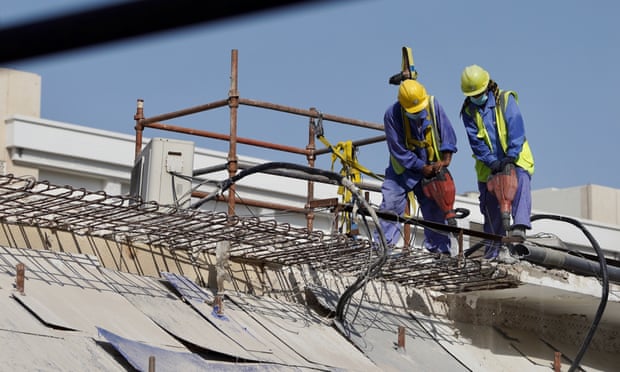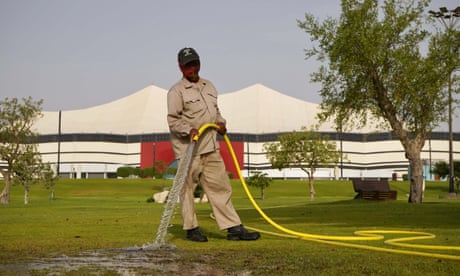Migrant workers in labour camps face poor pay and conditions but their fear of losing those jobs underlines their exploitation

Construction workers in Qatar’s capital, Doha. Some migrant
workers claim they work 12-hour shifts, six days a week, for less than the legal rate.
THE GUARDIAN
Fri 23 Sep 2022
In a dusty car park, near to one of the largest labour camps in Qatar, Worker A gets into my car. I will call him Worker A, not because I do not want to reveal his name, but because I do not know his name.
He only agrees to talk to me after I show him my name on the articles I have written and match it to my passport. I hand over my phone to prove I am not recording anything.
The reason he is reluctant to talk, he tells me, is that his employer had recently used a “spy” to root out troublemaking employees. “Everyone is afraid to speak out but we’re dying inside,” he says.
He claims they work 12-hour shifts for six days a week, but do not receive the legal rate for overtime pay. In all, he says, they earn the equivalent of about £335 a month. “Our manager has a [nice car] but on my salary I couldn’t even afford to buy its four tyres. I’m earning peanuts,” says Worker A.
In their labour camp, he alleges, six workers share a room, which is also illegal, and the food is so bad that he says “dogs wouldn’t eat it”.
He tells me about a co-worker, a young man who recently collapsed and died at his workplace, after saying he was feeling unwell but being ordered to work regardless.
Another source sent me a photo of the deceased worker. When I first met her, I asked if I could add her number to my phone so we could keep in touch. She told me to wait because her boss might be watching. A few minutes later, she discreetly slipped me a note with her number on it.
On a recent reporting trip I met up with another worker I had kept in touch with for years. Someone saw us talking and a few days later he was summoned by the police and interrogated.
This is how we report on the buildup to the world’s greatest football tournament: through secret meetings in car parks and messages that can be set to disappear within five minutes. Every sentence I write is carefully constructed so that I do not reveal anything that would put someone at risk.
This is how we report the buildup to the world’s greatest football tournament – through secret meetings and messaging apps
What are these workers afraid of? Being sent home. Because for all the problems they face, the brutal truth is that they need the work – and they need to pay off the debts they took on to get the work.
When the pandemic began, one worker told me everyone was terrified, but not of Covid. “Most of us borrowed money to come here. If we were sent home, how could we repay our debts? We’re afraid to return empty-handed,” he said.
“When they see you are trying to fight for your rights, they find any little excuse to send you home,” said another.
That fear even extends beyond Qatar’s borders. This week I was filming interviews with Nepali workers who had been sent home from Qatar recently, as companies wrap up construction projects on the eve of the World Cup. They had been promised two years of work, but had barely been in Qatar for six months and were struggling to repay their debts.
They agreed to talk, but at the end of each interview they said they feared being barred from getting another job in Qatar if they spoke out.

Workers at Qatar’s World Cup stadiums toil in debt and squalor
Every time workers tell me of the problems they have faced in Qatar, I ask: will you go back? And the answer is almost always “yes”, because they have so few other options. A day of manual labour in Nepal can earn as little as 400 rupees (£2.75), and so even Qatar’s paltry minimum wage, equivalent to about £8 a day, appears attractive.
Under Qatari employment law, foreign workers have the right to change jobs if their contract is terminated and legal procedures are in place if an employee does not receive their wages or allowances at the end of their contract.
The Qatari government also said a fund to support workers, including by reimbursing unpaid wages or benefits, had paid out £152.5m by last month.
Qatar – and all the other Gulf states – could tell a compelling story about how it has created opportunities and alleviated poverty for millions. And to an extent is has. But it is hard to avoid the conclusion that Qatar has also exploited that poverty, and the desperation of so many, to build the infrastructure for their nation and the World Cup.
“I pay school fees for three boys [back home]. They are my life,” Worker A tells me. “That’s why I’m here. If I go home now, my kids will starve.”
And so, for many like him, the only thing worse than being in Qatar is not being in Qatar.
Fri 23 Sep 2022
In a dusty car park, near to one of the largest labour camps in Qatar, Worker A gets into my car. I will call him Worker A, not because I do not want to reveal his name, but because I do not know his name.
He only agrees to talk to me after I show him my name on the articles I have written and match it to my passport. I hand over my phone to prove I am not recording anything.
The reason he is reluctant to talk, he tells me, is that his employer had recently used a “spy” to root out troublemaking employees. “Everyone is afraid to speak out but we’re dying inside,” he says.
He claims they work 12-hour shifts for six days a week, but do not receive the legal rate for overtime pay. In all, he says, they earn the equivalent of about £335 a month. “Our manager has a [nice car] but on my salary I couldn’t even afford to buy its four tyres. I’m earning peanuts,” says Worker A.
In their labour camp, he alleges, six workers share a room, which is also illegal, and the food is so bad that he says “dogs wouldn’t eat it”.
He tells me about a co-worker, a young man who recently collapsed and died at his workplace, after saying he was feeling unwell but being ordered to work regardless.
Another source sent me a photo of the deceased worker. When I first met her, I asked if I could add her number to my phone so we could keep in touch. She told me to wait because her boss might be watching. A few minutes later, she discreetly slipped me a note with her number on it.
On a recent reporting trip I met up with another worker I had kept in touch with for years. Someone saw us talking and a few days later he was summoned by the police and interrogated.
This is how we report on the buildup to the world’s greatest football tournament: through secret meetings in car parks and messages that can be set to disappear within five minutes. Every sentence I write is carefully constructed so that I do not reveal anything that would put someone at risk.
This is how we report the buildup to the world’s greatest football tournament – through secret meetings and messaging apps
What are these workers afraid of? Being sent home. Because for all the problems they face, the brutal truth is that they need the work – and they need to pay off the debts they took on to get the work.
When the pandemic began, one worker told me everyone was terrified, but not of Covid. “Most of us borrowed money to come here. If we were sent home, how could we repay our debts? We’re afraid to return empty-handed,” he said.
“When they see you are trying to fight for your rights, they find any little excuse to send you home,” said another.
That fear even extends beyond Qatar’s borders. This week I was filming interviews with Nepali workers who had been sent home from Qatar recently, as companies wrap up construction projects on the eve of the World Cup. They had been promised two years of work, but had barely been in Qatar for six months and were struggling to repay their debts.
They agreed to talk, but at the end of each interview they said they feared being barred from getting another job in Qatar if they spoke out.

Workers at Qatar’s World Cup stadiums toil in debt and squalor
Every time workers tell me of the problems they have faced in Qatar, I ask: will you go back? And the answer is almost always “yes”, because they have so few other options. A day of manual labour in Nepal can earn as little as 400 rupees (£2.75), and so even Qatar’s paltry minimum wage, equivalent to about £8 a day, appears attractive.
Under Qatari employment law, foreign workers have the right to change jobs if their contract is terminated and legal procedures are in place if an employee does not receive their wages or allowances at the end of their contract.
The Qatari government also said a fund to support workers, including by reimbursing unpaid wages or benefits, had paid out £152.5m by last month.
Qatar – and all the other Gulf states – could tell a compelling story about how it has created opportunities and alleviated poverty for millions. And to an extent is has. But it is hard to avoid the conclusion that Qatar has also exploited that poverty, and the desperation of so many, to build the infrastructure for their nation and the World Cup.
“I pay school fees for three boys [back home]. They are my life,” Worker A tells me. “That’s why I’m here. If I go home now, my kids will starve.”
And so, for many like him, the only thing worse than being in Qatar is not being in Qatar.
No comments:
Post a Comment